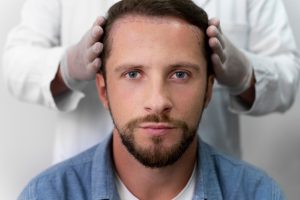
Have you noticed more hair falling out lately? Dr. Omar, a hair loss expert, shares five causes of hair loss and a proven solution.
For many, hair is a key part of our identity, giving us character and confidence. Surprisingly, around 8 million women in the UK experience some hair loss or thinning at some point. If you’re experiencing this but haven’t spoken about it, you’re not alone. About 46% of women feel too insecure to discuss their hair concerns.
We naturally lose about 100 to 150 hairs each day. This is because our hair follicles go through three stages in the Hair Growth Cycle:
1. Growth (Anagen) Phase: About 85-90% of our hair is growing actively, a process lasting between three to five years.
2. Transition (Catagen) Phase: Around 1% of our hair stops growing and detaches from the follicle, lasting one to two weeks.
3. Resting (Telogen) Phase: About 10-15% of our hair is inactive for around three to four months before shedding.
Hair loss becomes significant if you shed more hair than usual or if it doesn’t grow back. This can be sudden or gradual and can affect the scalp in various ways. Here are common causes of hair loss:
1. Hereditary Factors: Genetic hair loss, known as male or female pattern baldness, is the most common cause, leading to a gradual reduction in hair volume, receding hairlines in men, and thinning in women. Rebalancing the hair growth cycle with supplements, such as Proteoglycan Replacement Therapy, can help since proteoglycans are crucial for healthy hair growth.
2. Hormonal Changes: Hormonal imbalances can lead to hair loss in both men and women due to increased levels of dihydrotestosterone (DHT), which influences hair follicles negatively. This is more prominent in post-menopausal women or those with conditions like PCOS.
3. Stress: High stress levels can trigger hair loss due to increased cortisol production, leading to inflammation in the body. This can disrupt the hair growth cycle, causing conditions like telogen effluvium, where stress forces hair into the resting phase prematurely.
4. Medication Side Effects: Some medications for conditions like cancer, high blood pressure, and depression can disrupt the hair growth cycle, leading to hair loss. This can manifest as telogen effluvium or anagen effluvium (common in chemotherapy).
5. Pregnancy: During pregnancy, high levels of hormones can make hair thicker, but some expectant mothers may experience thinning, especially in the first trimester. Post-birth, many women face excessive shedding due to hormonal changes, known as postpartum hair loss.
If you’re experiencing significant hair loss, it might be due to a disrupted Hair Growth Cycle. Consulting a doctor and exploring treatments like Proteoglycan Replacement Therapy with products such as Nourkrin, which has been clinically proven to aid hair growth, might be beneficial. The therapy uses a fish extract called Marilex, rich in key proteoglycans needed for a healthy hair cycle.
Remember, if hair loss is severe or persistent, it’s essential to seek medical advice to identify the underlying cause and find an effective treatment.




